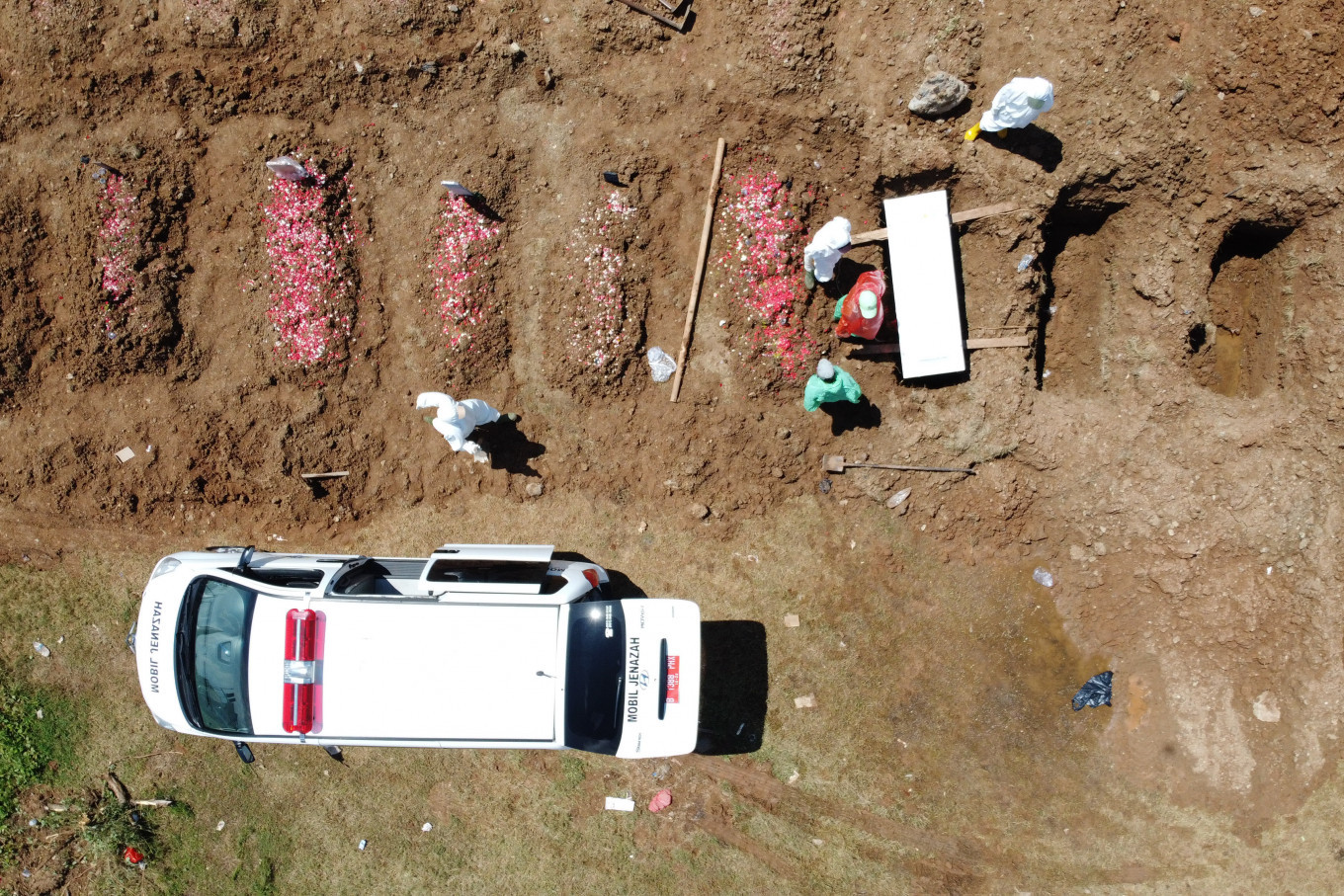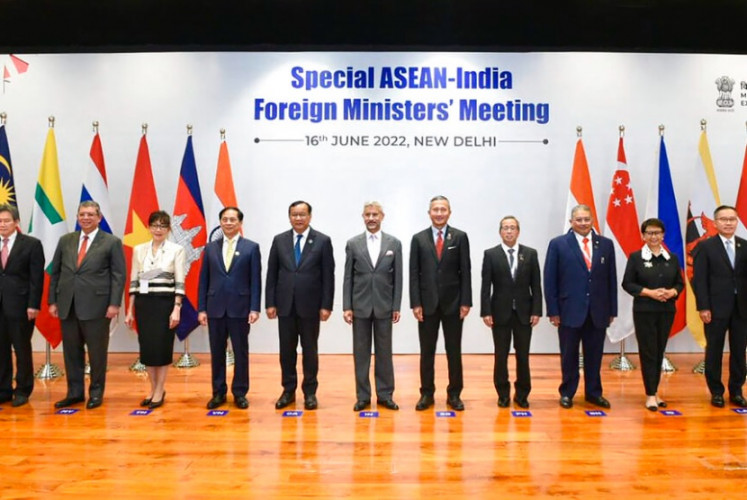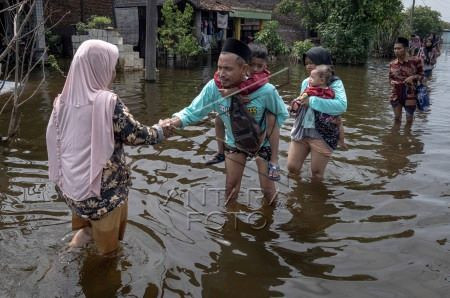When your dead body is rejected everywhere
In many places many grieving families, friends and relatives have had to endure the pain, not just because of the death of someone they loved, but because residents or even neighbors have rejected the body for burial. These people are too afraid of the virus contagion despite repeated explanations from the government and health experts. But who can blame them?
Change Size
 Laid to rest: An ambulance is seen parked at the Tegal Alur public cemetery in West Jakarta on Tuesday as workers bury a COVID-19 victim. On average 10 to 15 bodies of coronavirus victims are buried in the cemetery every day. (JP/Donny Fernando)
Laid to rest: An ambulance is seen parked at the Tegal Alur public cemetery in West Jakarta on Tuesday as workers bury a COVID-19 victim. On average 10 to 15 bodies of coronavirus victims are buried in the cemetery every day. (JP/Donny Fernando)
F
irst of all, I should make it clear that I am writing about a human tragedy, which has unfolded as many dead bodies here and in other parts of the world are not able to be buried according to the deceased families’ wishes amid this COVID-19 pandemic.
Let us hope the horror will soon end, that the figure for fatalities dramatically falls and the number of people recovering from this virus rises exponentially.
Death is frightening for many, especially now that the virus had claimed nearly 75,000 lives worldwide. The pandemic, therefore, offers us an opportunity to reflect on what we can do to console people who have lost loved ones.
The virus knows no religious affiliation, socio-economic strata or political lines. Look at British Prime Minister Boris Johnson, who tested positive for the virus. Let us pray for his recovery.
I have often shared hopes that my wife and children will arrange a beautiful funeral service on my death. I also want a flattering eulogy from friends, although they may have to lie. You, too, may have your own wishes about how your funeral should look like.
But now you may forget about all that! The best you can pray for is that your family will not find any difficulties in burying you as soon as possible, as many of the families of people who have died of COVID-19 and even other diseases have discovered recently.
The Jakarta Post front page on April 1, carried a picture of three women and a young man who watched from afar the body of their loved one being buried hurriedly by mask-wearing grave workers in a Jakarta cemetery. The family of the deceased was quite lucky. At least the body could be buried.
On the same day, I received a horrifying video, showing a dead body thrown into a smoldering fire for cremation, apparently in Italy.
In many places many grieving families, friends and relatives have had to endure the pain, not just because of the death of someone they loved, but because residents or even neighbors have rejected the body for burial. These people are too afraid of the virus contagion despite repeated explanations from the government and health experts. But who can blame them?
The government and the Indonesian Ulema Council have issued protocols on the burial of COVID-19 patients. Often the protocols apply to people who showed symptoms of infection before they died.
Early this year, when China was devastated by the COVID-19, many world leaders, including United States President Donald Trump and our leader President Joko “Jokowi” Widodo, confidently warned their peoples against paranoia, because their governments had more than enough knowledge and experience to handle the deadly virus. When the situation worsened, many have had to defend themselves from the virus based on their intuition or information from unofficial sources.
But let us put aside our government’s shortcomings in managing this crisis.
Last week, AFP reported that a young Iraqi man had to wait for one week for the burial of his elderly father who had died of COVID-19. Every cemetery in his province refused to accept his body. Armed men threatened to burn his car with his father’s body inside if the family defied their objections.
In Milan, the family of a coronavirus victim had to keep the corpse for 36 hours because ambulances refused to carry the body. This has happened in other places hit hardest by the virus.
Central Java Governor Ganjar Pranowo desperately pleaded with local people to allow the burials of COVID-19 patients because their coffins met the requirements set by the World Health Organization.
West Java Governor Ridwan Kamil has asked his people to show compassion to the families who have lost their loved ones to the virus. Ridwan reminded them that the same fate could befall anyone.
East Java Governor Khofifah Indar Parawansa has also tried hard, often in vain, to remind people that their refusal to allow the burial of the dead goes against the teachings of every religion.
Catholics, like me, are entering Holy Week. On Friday, we commemorate the crucifixion and death of Jesus Christ and on Sunday we celebrate Easter, His resurrection.
There are two quotes from Jesus, which we will hear again in the reading of the Bible during Holy Week. Jesus uttered “My Father, if it be possible, let this cup pass from me, but let not my will, but yours be done,” before His arrest, and cried out “My God, my God, why have you forsaken me?” a few moments before His death.
Even Jesus expressed his fear and solitude as death approached. Each one of us, regardless of faith, may feel the same one day.
And today such loneliness is commonplace thanks to COVID-19. No wonder then that a highly respected religious leader has called on Indonesians to show respect for those severely affected by this pandemic.
What preparations can you make before death if your dead body is rejected everywhere, or your family cannot arrange even the simplest funeral service for you? Trust me, very little, perhaps nothing at all.
Helping others— your employees, neighbors and those in need — will ease your anxiety. We may find nowhere for us to be laid to rest when we die, or no proper funeral, but many may remember our good deeds even though they cannot pay their last respects to us.
We may fear death, but never be afraid of helping others during this very difficult time.








